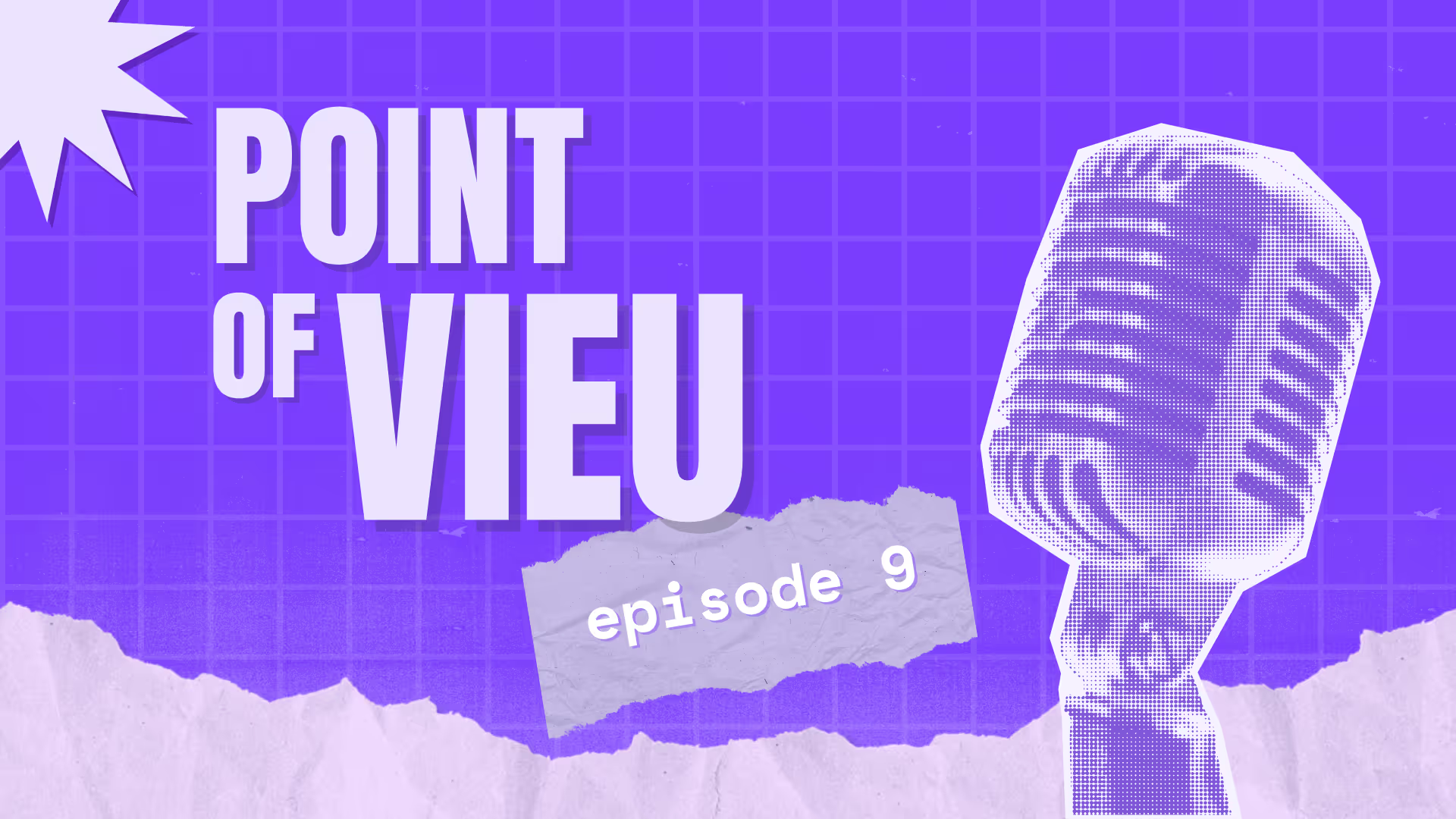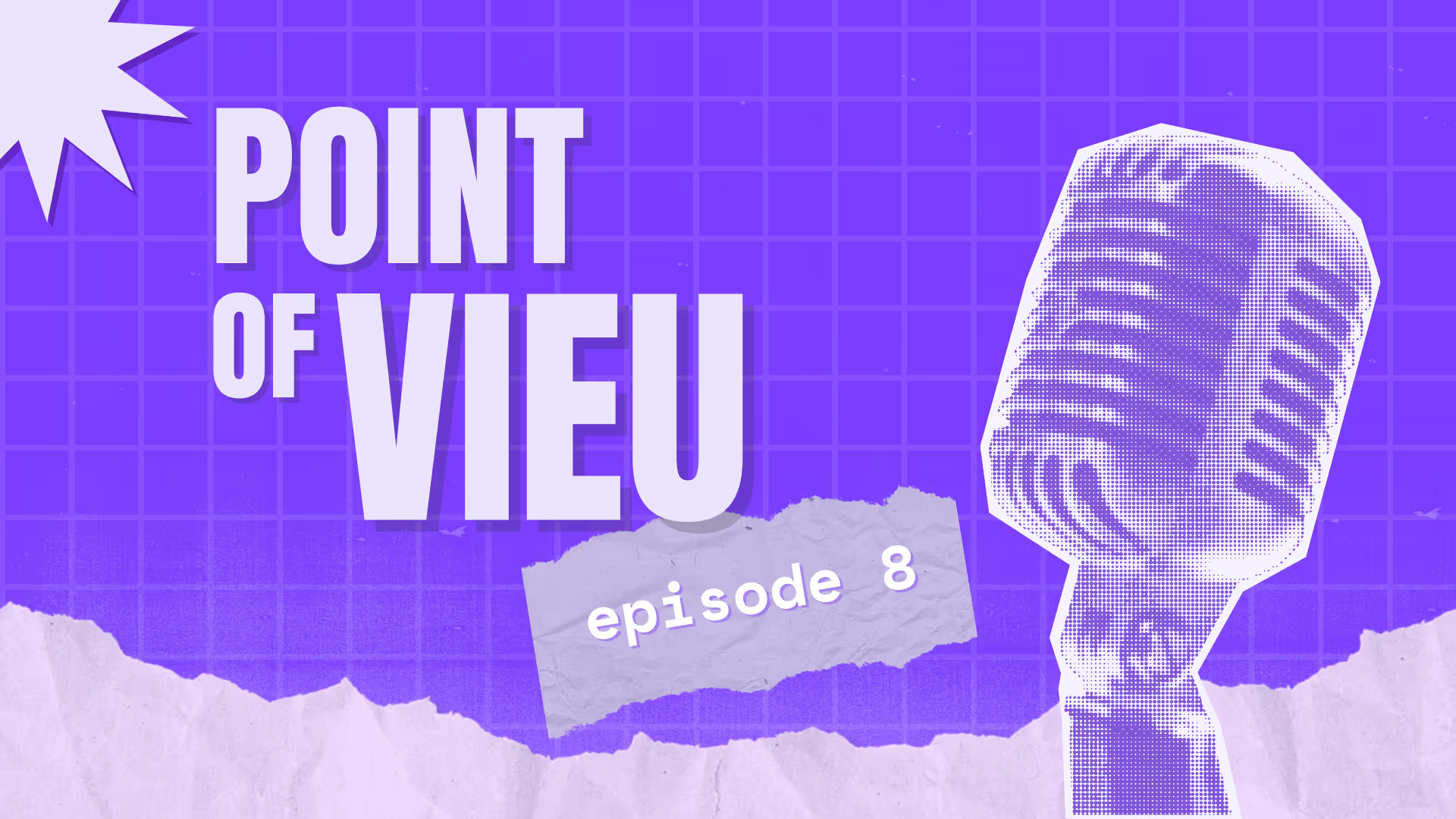B2B sales is a competitive arena where winning deals is paramount. But what truly determines success? Is it outsmarting the competition, or something else entirely?
We gathered insights in the second episode of our “Point of Vieu” from seasoned sales leaders to uncover the real challenges and strategies on how to avoid losing to competitors.
“How do you avoid losing to your competitors?”
Read on to know the tips given by our experts:
Ayush Sharma, Director of Sales, Rippling
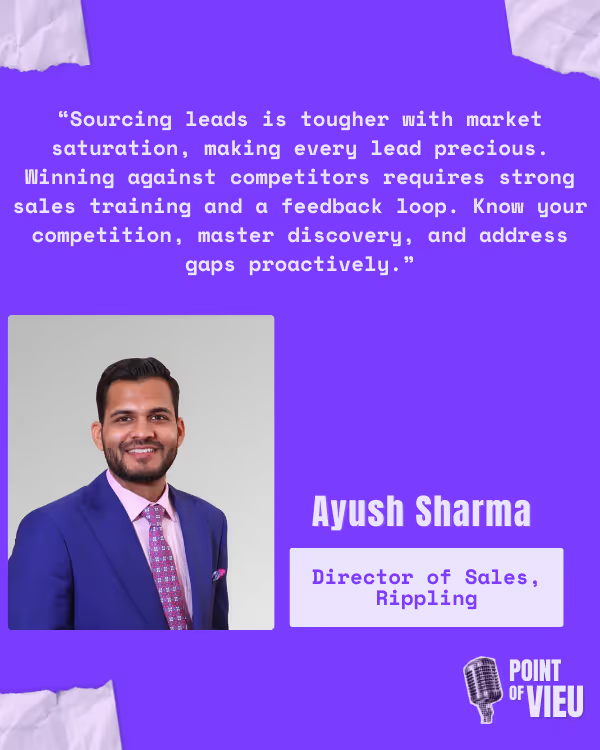
Ayush currently leads the sales team at Rippling, Bangalore. His teams serve the US, EMEA, and Indian markets. He has seven years of experience in the B2B Saas space. He worked for companies like Whatfix for four years and worked at another Silicon Valley company called Carta.
“Sourcing a lead is harder than it used to be. Buyers are distracted by so many vendors in the market. Everybody has access to digital platforms. Everybody is doing SEO, inbound marketing, ads, and so on. Hence, every lead is very precious.
The fundamental to not losing to your competition is twofold. One is the sales training and then the other one is the product feedback loop.
Your sellers on the ground know most about your competition. They know most about the gaps that they see in their product. They must give feedback to the product team so those are filled in immediately. It’s important to address a few things during the sales training -know your competition. If you know your competition, you will be able to understand the traps that your competitor is putting on during the sales cycle.
You may ask your buyers at the start, ‘Hey, are you evaluating other vendors?’ It’s likely that the buyers will not disclose that information.
However, their line of questioning will help you understand that this question might be coming from a competitor or a trap that has been put there. So, it is important to know your competition, and the kind of traps they put against you.
The most fundamental skill of a sales rep is discovery. If you are making the right discovery and early into the sales cycle, if you're asking questions about, ‘Hey, are you evaluating other vendors? If yes, I can help you compare us against the vendor you are evaluating.’
There might be a scenario where a buyer is looking at 5 different vendors, and your probability is 20%. So, you may want to eliminate two or 3 vendors from the race by saying, ‘Hey, we compete with these vendors.’ So suddenly your pool is reduced to two or three vendors, and your probability increases from 20% to 50%. So, I think discovery is crucial.
Keep asking your buyers early in the sales cycle if they are evaluating vendors. So many times, we realize that towards the end of cycle that there was a vendor in picture, and we lost the deal to them. We never identified that vendor in the mix.
Then, keep looking for gaps in the sales cycle. I always asked my leads, ‘Where do you think our product is lagging in comparison to the other vendors you are evaluating?’
It is important because at times, buyers do micro feature to feature analysis, and the buyer may feel that some vendors have a feature which you don't have. It is important to acknowledge it if you don’t. But then also assess whether it is a must have and whether it is a deal breaker or not.
If it is not a deal breaker, you can do a lot of things around commercials. You can do a lot of things around services to smoothen the mess that your product may have.”
Prakhar Jain, VP of Sales, Whatfix
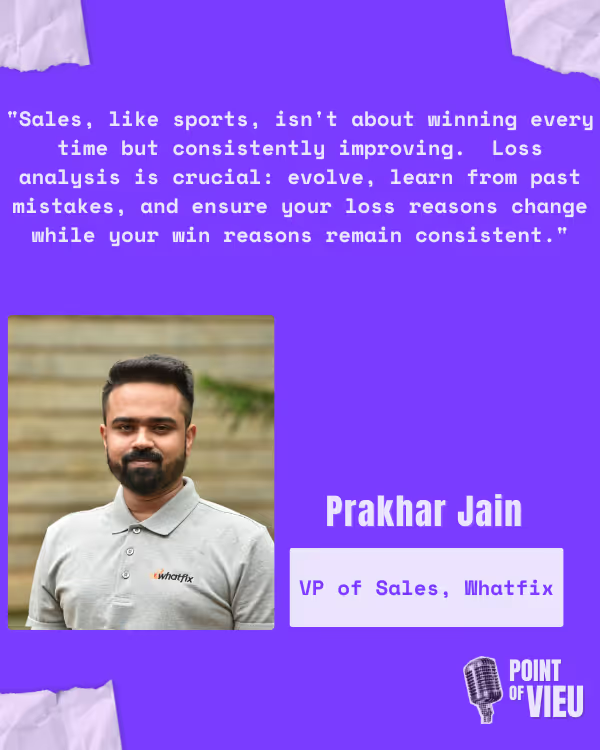
Prakhar was employee #1 at Whatfix and has been working with them for the last 10 years. Whatfix is a digital adoption platform that works with companies to simplify their end user experience. It strives to make technology user savvy. His role is to take care of new business for North America and EMEA.
“This is more like how it happens in sports. You want to win all the games, of course. You practice for it. Prepare for it. But do you win all the games? The answer is no. It's the same in sales as well. We'll not win every single deal.
It's also sometimes that people tend to be too hard on themselves when they ask themselves, ‘Why are we losing to the competition?’
I think it's important to be paranoid about it so that you continue to focus on how we try and reduce our loss percentage. It’s surely a good focus area. But just being paranoid about why we are losing in the first place is not a good rationale to have.
I think loss analysis is a good way to get to the bottom of why you are losing in the first place. If you're losing for the same reasons, consistently quarter on quarter, it is a massive problem. There is something seriously wrong with how you're operating, and some serious introspection should happen.
Your loss reasons must keep changing quarterly.
You should evolve and learn from your previous losses and ensure that you're not losing for the same reasons again. You should learn from your past mistakes.
And when you look at your wins in general, your wins should be consistent. Your win reasons should be consistent, and more reasons should be added to it. So that's how you must look at this analysis.
You will still get to the bottom of the reasons and even though they are changing, there will be newer reasons because the market is ever evolving, and your competitors are probably doing the same as what I am suggesting. So, testing will be hard, but you must be paranoid and focused on the controllables.
Certain losses happen because of bad discovery. You will realize how many prospects went through the latter stages of the sales cycle only for you to find out that they were never a good fit in the first place.
The competitor that you lost to, they were always a good fit for that prospect, and that's how the market is. But you still wanted to give it a shot and try. You can't completely avoid that as well.”
Bethany Ibarra, Chief Revenue Officer
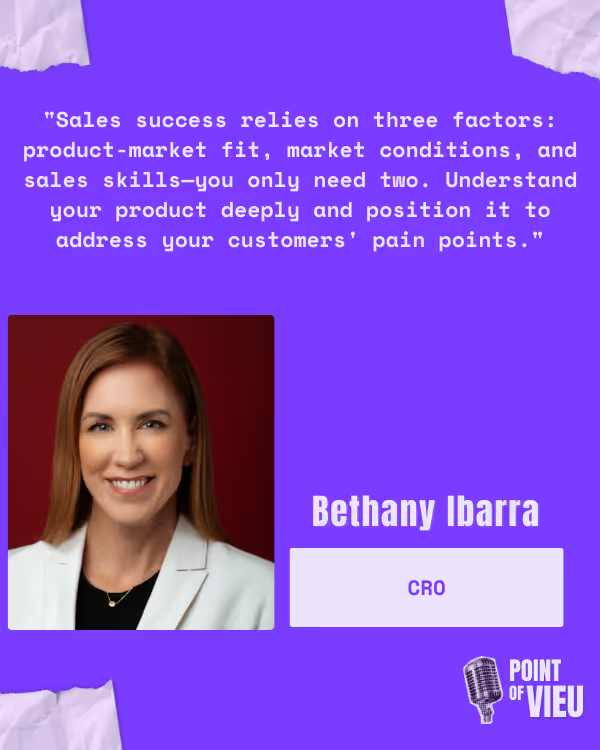
Bethany spent the first half of her career working across the business cycle at Motorola. She uncovered an opportunity that led her to build her first P&L, and launch her first product. Since then, she has worked in commercial leadership in companies such as Lenovo, Google, and Motorola. Recently, she was the Chief Revenue Officer at an engineering firm that designed and developed machine learning systems.
“There's not one answer to this because every deal and opportunity has a different landscape even though there's certainly patterns. But I had someone wise in my network once tell me there's 3 key success factors to anyone driving their sales targets.
One is a great product with the right product market fit.
Then, macroeconomic factors like an upswing in a market, a bubble, etcetera.
Third is a is sales skills or sales, ability of that individual, and you only need two.
Taking a step back, and understanding your product is paramount. That sounds pedantic, but its importance cannot be overstated.
The market does change. Your product or services evolve and so does your understanding how to position it. People running businesses have two key motivators for why they buy - pain avoidance and pleasure seeking. So, understanding how to craft an authentic message about why your product or service allows that key stakeholder or business to avoid pain is key.
Businesses think about risk. They're always assessing risk even more than pleasure seeking in a B2B environment. It is different than B2C. Businesses try to ensure that a launch is on time and meets their revenue targets. Stakeholders try to avoid a career mishap by picking a lower-cost vendor that maybe can't meet quality goals.
So, avoiding pain is key in that positioning throughout the sales cycle and throughout the entire customer life cycle.
It is also important to understand the motivators of your target customers, how to crisply communicate that and continually work with your team, understanding why your company wins and why it doesn’t. There isn't always a known approach to maintaining a robust pipeline with a higher win rate.”
Joe McNeill, Chief Revenue Officer, Influ2
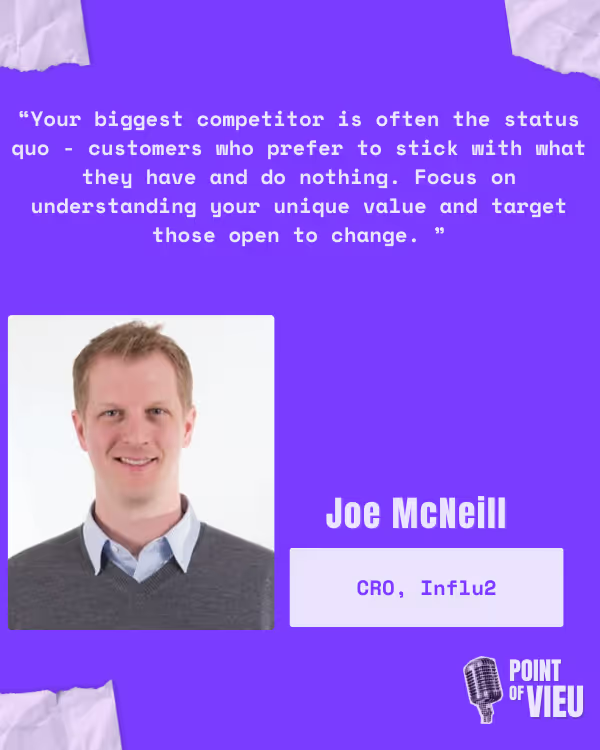
Joe McNeill is the CRO at Influ2. They do contact focused advertising to help sales and marketing teams align and improve prospecting conversion rates. He’s a B2B Technology Sales Leader who combines an enthusiasm for client service delivery, employee empowerment, and robust revenue operations to position organizations to scale & grow.
“I think it's a fine line because if you look at the amount of deals you lose, your biggest competition is always going to be the status quo. The status Quo doesn’t buy anything. They don't buy from your competitors either. They just keep going with whatever they have, unless you're in a real commoditized market, like you're selling telecom or internet services or insurance where they must have something.
But in my world, in the organizations I've been in, the thing we've competed against the most is the status quo - they just don't buy anything. So, a lot of times you can get too focused on beating the competition. I think you just need to understand - What are we best at?
In what areas does our product and organization support prospects and customers the most? In my last company, we had a copycat competitor that was cheaper than us. So, we knew that if the prospects were focused on price only and not service, we were going to lose, but that's okay.
If you get too hung up and try to win every deal, you can get lost. So. you need to focus on – where is our sweet spot? What are we best at? The focus should be on the customers who are seeking what you offer to them. If price is your main priority, then maybe we're not the best solution for you.
But honestly, for me, I spend most of my time focusing on how we sell to the status quo and the people who buy nothing because that's where you lose the most more than any other competitor.”
Conclusion
It's easy to let the fear of losing to competitors engulf you. However, success often lies not in outsmarting the competition but in understanding your strengths, addressing the real challenges in the market, and continually evolving your approach.
Winning in B2B sales is about honing your strategy, continually learning, and positioning your product as the best solution to your customers’ needs. You can reduce losses to competitors and strengthen your overall sales success by applying these fundamentals.

